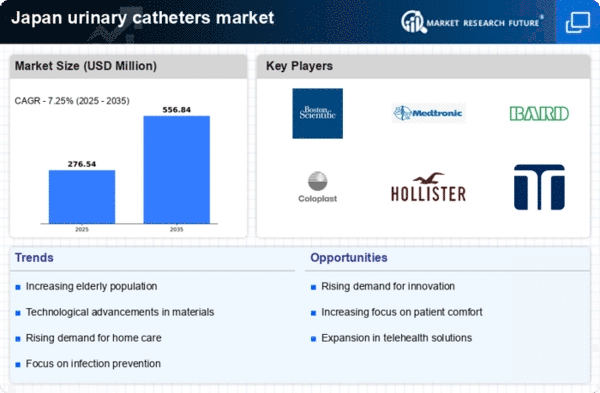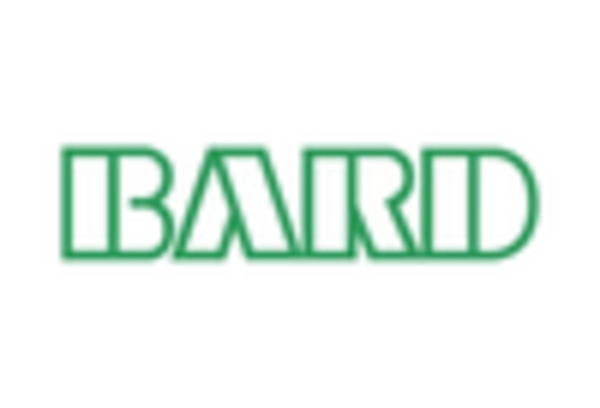Government Initiatives and Funding
Government initiatives aimed at improving healthcare infrastructure in Japan are playing a crucial role in the urinary catheters market. Increased funding for healthcare facilities, particularly in rural areas, is expected to enhance access to necessary medical supplies, including urinary catheters. The Japanese government has been actively promoting policies to improve the quality of care for patients with chronic conditions, which includes the provision of essential medical devices. As a result, hospitals and clinics are likely to see an uptick in the procurement of urinary catheters, thereby driving market growth. The urinary catheters market stands to benefit from these initiatives, as they align with the broader goals of enhancing patient care and ensuring that medical facilities are well-equipped to handle the needs of their populations.
Increase in Home Healthcare Services
The rise of home healthcare services in Japan is emerging as a significant driver for the urinary catheters market. With an increasing number of patients opting for home-based care, there is a growing need for medical supplies that can be used in non-hospital settings. Urinary catheters are essential for patients requiring long-term management of urinary conditions at home. The convenience and comfort of receiving care in familiar surroundings are leading to a higher demand for home healthcare solutions, including urinary catheters. This trend is likely to encourage manufacturers to develop products tailored for home use, further expanding the urinary catheters market. As the home healthcare sector continues to grow, the demand for urinary catheters is expected to rise correspondingly, reflecting changing patient preferences.
Rising Incidence of Urinary Disorders
The increasing prevalence of urinary disorders in Japan is a notable driver for the urinary catheters market. Conditions such as urinary incontinence and bladder dysfunction are becoming more common, particularly among the aging population. According to recent health statistics, approximately 30% of elderly individuals in Japan experience some form of urinary incontinence, which necessitates the use of catheters. This growing patient base is likely to propel demand for urinary catheters, as healthcare providers seek effective solutions to manage these conditions. Furthermore, the rising awareness of urinary health issues among the general population may lead to increased consultations and subsequent catheter usage, thereby expanding the market. The urinary catheters market is thus positioned to benefit from this upward trend in urinary disorders, as healthcare systems adapt to meet the needs of affected individuals.
Technological Innovations in Catheter Design
Innovations in catheter technology are significantly influencing the urinary catheters market. Manufacturers are increasingly focusing on developing advanced catheters that enhance patient comfort and reduce the risk of complications. For instance, the introduction of hydrophilic-coated catheters has been shown to decrease friction and improve ease of insertion, which is particularly beneficial for patients with sensitive conditions. Additionally, smart catheters equipped with sensors for monitoring urinary output are emerging, potentially transforming patient management. The urinary catheters market is likely to see a surge in demand as healthcare providers adopt these innovative solutions to improve patient outcomes. The market value for technologically advanced catheters is projected to grow, reflecting the increasing investment in research and development by leading manufacturers.
Growing Awareness of Catheter-Associated Complications
There is a growing awareness of catheter-associated complications among healthcare professionals and patients in Japan, which is influencing the urinary catheters market. As the risks associated with catheter use, such as urinary tract infections (UTIs) and other complications, become more widely recognized, there is an increasing emphasis on the selection of high-quality catheters. This awareness is prompting healthcare providers to invest in better products that minimize risks, thereby driving demand for advanced urinary catheters. Educational campaigns and training programs aimed at healthcare staff are also contributing to this trend, as they highlight best practices in catheter management. Consequently, the urinary catheters market is likely to experience growth as providers seek to enhance patient safety and reduce the incidence of complications.
















